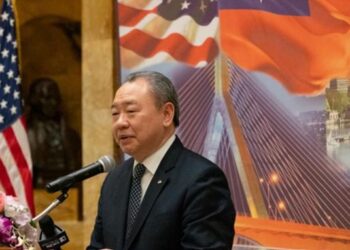On Wednesday’s WarRoom, Peter Navarro and Ric Grenell sharply critiqued the Biden administration’s foreign policy, focusing on its handling of the Gaza crisis and its approach to China. Their conversation reflected broader concerns about the current administration’s strategic direction and its impact on global affairs.
Drawing on his extensive experience at the United Nations, Grenell emphasized the Biden administration’s strategic failures. Grenell, who served as the U.S. Ambassador to Germany and the Acting Director of National Intelligence under President Trump, expressed deep dissatisfaction with how the current administration has navigated complex international relations.
He particularly criticized the Biden team for mishandling the balance of power between Russia and China, noting, “The mistake of the U.S. foreign policy is allowing Russia and China to come together.”
Grenell’s statement reflects a concern that the administration’s lack of cohesive strategy has allowed these two powers to align against Western interests, further complicating global diplomacy.
Grenell’s critique extends to the current state of affairs in the South China Sea, where he believes the inexperience of Vice President Kamala Harris and President Joe Biden has emboldened China. He pointed out that while the U.S. is distracted by conflicts in the Middle East and Europe, China is advancing its own agenda, including expanding its military capabilities and economic influence. Grenell advocates for a more assertive U.S. foreign policy, suggesting that strengthening alliances with countries like India, Turkey, and the Philippines could counterbalance China’s growing influence.
He also criticized past decisions, such as China’s entry into the World Trade Organization (WTO) under President Bill Clinton, which he argues has worsened the situation by allowing China to grow its economic power without adhering to democratic norms.
Grenell’s commentary also highlighted the broader impact of these failures in foreign policy on global stability. He argued that the Biden administration’s focus on the Middle East, coupled with its re-engagement with Iran, has undermined previous successes in the region. He stated, "A ceasefire is an admission that you had a war that you failed to keep the peace that Donald Trump handed you.”
This quote underscores Grenell’s belief that Trump’s foreign policy, which included isolating Iran and fostering Arab-Israeli peace agreements, effectively maintained regional stability. Grenell contends that Biden’s reversal of these policies, particularly lifting sanctions on Iran, has encouraged adversaries and led to renewed conflicts, including the recent escalation in Gaza.
Grenell also drew a historical parallel to the Obama administration’s handling of the Arab Spring. He criticized President Obama for his approach to the Muslim Brotherhood and Bashar al-Assad, asserting that Obama’s hesitancy and failure to act decisively set a precedent of weakness. Grenell believes that this precedent has carried over into the Biden administration, contributing to the current chaos in the Middle East. He argued that the Democrats’ tendency to "cozy up to Iran” instead of maintaining the pressure that Trump applied has exacerbated the instability in the region.
In their conversation, Navarro and Grenell exposed the importance of strong, strategic leadership in U.S. foreign policy. Grenell’s extensive experience and Navarro’s focus on economic nationalism highlight a consensus on the need for a more robust and coherent approach to international relations.
They both advocate for a return to policies that prioritize U.S. interests and counteract the growing influence of adversarial powers like China and Iran. Their critique reflects a broader dissatisfaction with the current administration’s handling of global challenges and a call for a more effective and strategic foreign policy.
Watch the the two-part interview covering these topics, from Wednesday’s WarRoom:





